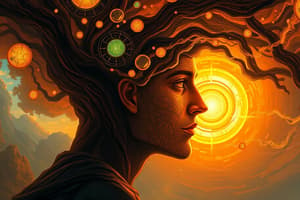Podcast
Questions and Answers
What is the main theme of the philosophical approach known as the 'sense of wonder'?
What is the main theme of the philosophical approach known as the 'sense of wonder'?
- Rational analysis of phenomena
- Understanding life through limits
- Doubt of established ideas
- Inquiry driven by curiosity about experiences (correct)
Which philosopher is known for the statement 'Cogito, ergo sum'?
Which philosopher is known for the statement 'Cogito, ergo sum'?
- Karl Jaspers
- Socrates
- Plato
- René Descartes (correct)
According to Karl Jaspers, how do limit situations affect human understanding?
According to Karl Jaspers, how do limit situations affect human understanding?
- They eliminate doubt about established beliefs.
- They might cause helplessness but can lead to new perspectives. (correct)
- They enhance emotional stability.
- They provide instant clarity and knowledge.
What distinguishes a human act from an act of man?
What distinguishes a human act from an act of man?
What does Socrates suggest about the nature of life and knowledge?
What does Socrates suggest about the nature of life and knowledge?
Deliberate reflection is primarily aimed at which of the following outcomes?
Deliberate reflection is primarily aimed at which of the following outcomes?
Which type of truth is based on personal experiences and sensory proof?
Which type of truth is based on personal experiences and sensory proof?
What is the primary definition of transcendence in the context provided?
What is the primary definition of transcendence in the context provided?
How does biocentrism differ from anthropocentrism in environmental ethics?
How does biocentrism differ from anthropocentrism in environmental ethics?
Which statement best describes the paradox of being embodied?
Which statement best describes the paradox of being embodied?
Flashcards are hidden until you start studying
Study Notes
Constant Realities in Our World
- Change and the mind's curiosity are fundamental aspects of human existence.
Philosophy Defined
- Philosophy investigates ultimate causes, reasons, and principles governing all things through human reason.
Mind's Potency: Doubt
- Rene Descartes, a French philosopher, emphasized questioning established ideas and even doubted his own existence.
- Famous for "Cogito, ergo sum" which translates to "I think, therefore I am," showcasing the necessity of verification before acceptance of truth.
Sense of Wonder
- Plato, a Greek philosopher, noted that human experiences generate curiosity and questions, some without definitive answers.
- Wonder arises when encountering experiences for the first time.
Limit Situations
- Karl Jaspers, a Swiss-German philosopher, stated that challenging experiences provoke helplessness, anxiety, or dread.
- Reason can help understand adverse conditions and facilitate the acquisition of new knowledge.
Love of Wisdom
- The pursuit of knowledge is intrinsic to the human mind, as expressed by Socrates.
- Socrates famously remarked, "The unexamined life is not worth living," and highlighted the importance of recognizing one’s own ignorance.
Perspectives: Holistic vs. Partial
- A holistic perspective considers the larger patterns or "big picture" in analyzing situations.
- A partial perspective focuses on specific aspects to gain deeper understanding.
Deliberate Reflection
- Reflection involves examining thoughts, feelings, and actions for learning and growth.
- Critical analysis through reflection enhances problem-solving and decision-making abilities.
Characteristics of Deliberate Action
- Deliberate actions are willed and intended, requiring knowledge, freedom, and voluntariness.
- Human acts are actions that are intended, while acts of man may be unintentional but can become human acts with consent.
Distinguishing Opinion from Truth
- Opinions are subjective statements needing verification and reasoning to be validated.
- Truth aligns with mental understanding and must be proven through verification and experimentation.
Types of Truth
- Personal Truth is justified through sensory experience by the individual.
- Objective Truth is grounded in facts and withstands testing.
- Social Truth is achieved through consensus and broader acceptance by a community.
Human Person: Embodied Existence
- Human existence is defined by physical attributes such as age, sex, and race, causing inherent limitations that are not necessarily chosen.
- These limitations can lead to frustrations but also define human experience.
Paradox of Being Embodied
- The relationship between limitations and possibilities suggests that true potential arises through embracing limitations.
- Examples of individuals overcoming limitations include Manny Pacquiao and Hidilyn Diaz.
Transcendence
- The concept of transcendence, originating from Latin, means to go beyond ordinary limitations and physical needs, often associated with spiritual or religious states.
Opposable Thumb
- An anatomical feature allowing for advanced manipulation and tool use, contributing significantly to human evolution.
- Innovations in art and sports are partly credited to the unique functionality of the opposable thumb.
Relationship Between Environment and Humanity
- Anthropocentrism prioritizes human needs and capabilities in manipulating nature.
- Biocentrism emphasizes the inherent value of all organisms, illustrated by legislation like R.A. 8485 (The Animal Welfare Act of 1998).
- Ecocentrism recognizes the interconnectedness of all life forms within the ecological system.
Studying That Suits You
Use AI to generate personalized quizzes and flashcards to suit your learning preferences.




